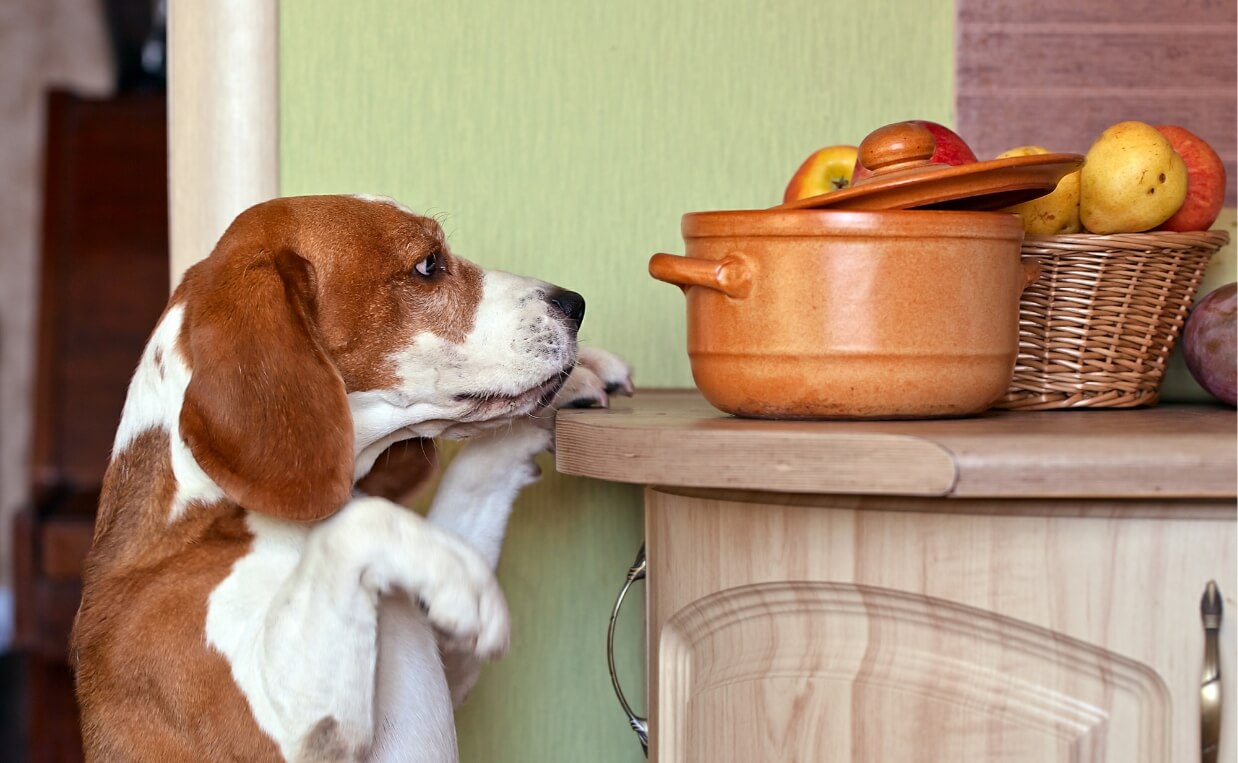
Dogs and humans digest foods differently. For this reason, some foods are safe for humans but may be toxic and potentially deadly for dogs.
On the other hand, some human foods are perfectly safe and even beneficial for dogs to eat.
Do you think of your dog as a carnivore? In fact, dogs are omnivores, meaning they can digest many types of foods, not just animal products. Research shows the ability to thrive on a diet rich in carbohydrates, in addition to meat, constituted a crucial step in the early domestication of canines. (Nature, 2013)
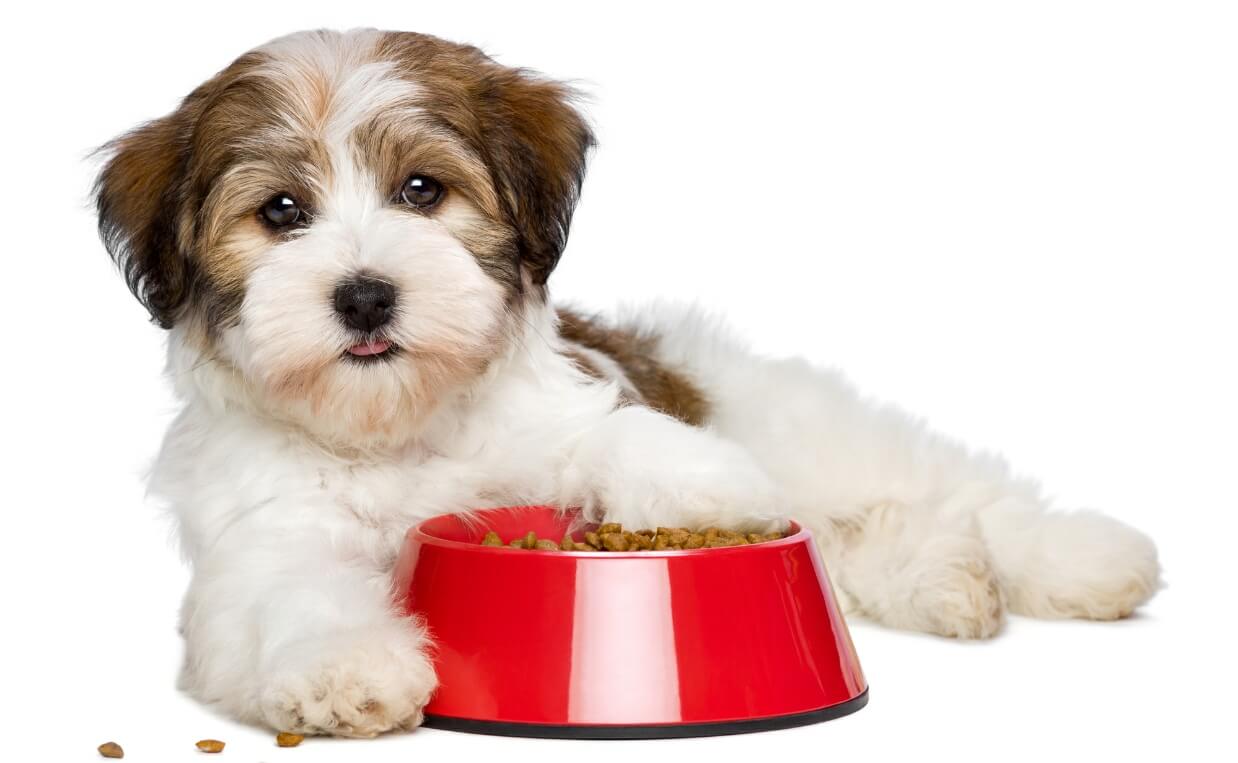
Keep in mind dogs, like humans, should not eat highly processed foods due to added sugar, fats, sodium, preservatives, artificial sugar and flavoring and other chemicals.
Note: be especially cautious your dog does not ingest xylitol or chocolate which can be life-threatening.
Here is a list of foods you can (and shouldn’t) feed your dog.

DAIRY
In general, dogs can eat dairy products. However, some dogs are lactose intolerant, so look for digestive issues (vomiting, diarrhea, etc.) and refrain from feeding your dog dairy products if your dog can’t tolerate them.
Dairy Products Dogs CAN Eat
- Cheese
- Eggs – just make sure they are fully cooked. Raw egg whites are not good for dogs.
- Milk
- Yogurt – plain, no sugar added
Dairy Products Dogs CAN’T Eat
Dogs should not eat foods containing a high sugar content or artificial sweeteners.
- Eggnog
- Ice cream
- Whipped cream
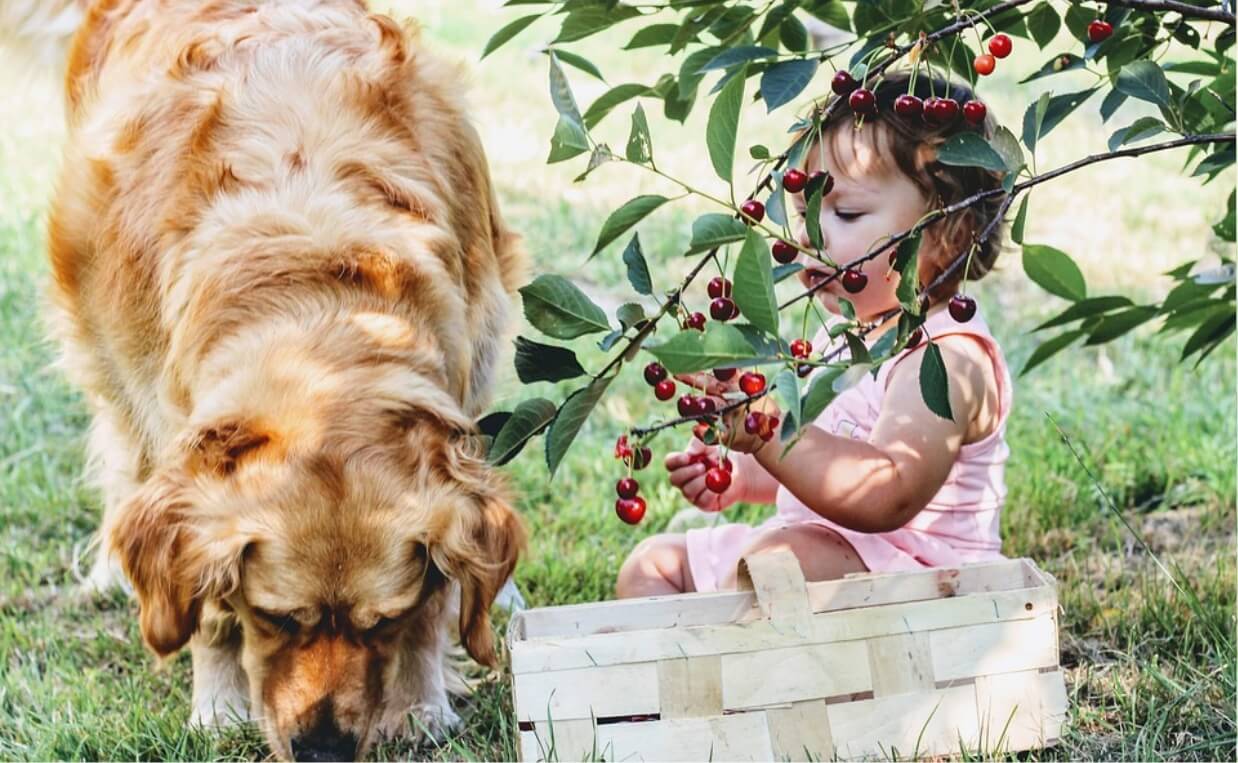
FRUITS
Most fruits are safe to feed your dog. Just don’t overfeed fruits if your dog is overweight or has diabetes.
Fruits Dogs CAN Eat
- Apples
- Apricots
- Bananas
- Blueberries
- Cantaloupe
- Carob
- Cranberries
- Figs
- Honeydew melons
- Mangoes
- Oranges
- Peaches
- Pears
- Plums
- Pineapple
- Raspberries
- Strawberries
- Watermelon
Fruits Dogs CAN’T Eat
Some fruits can be very toxic to dogs so be careful to not feed your dog these foods.
- Avocados – contain persin, which is toxic to dogs
- Cherries – contain cyanide which is poisonous if consumed in large enough quantities
- Citrus fruits (oranges, lemons, limes, grapefruit, tangerines, etc.) – cause upset stomach
- Grapes, raisins and currants – can lead to acute sudden kidney failure
- Persimmons – cause stomach upset
- Tomatoes – contain solanine, which can be toxic to dogs
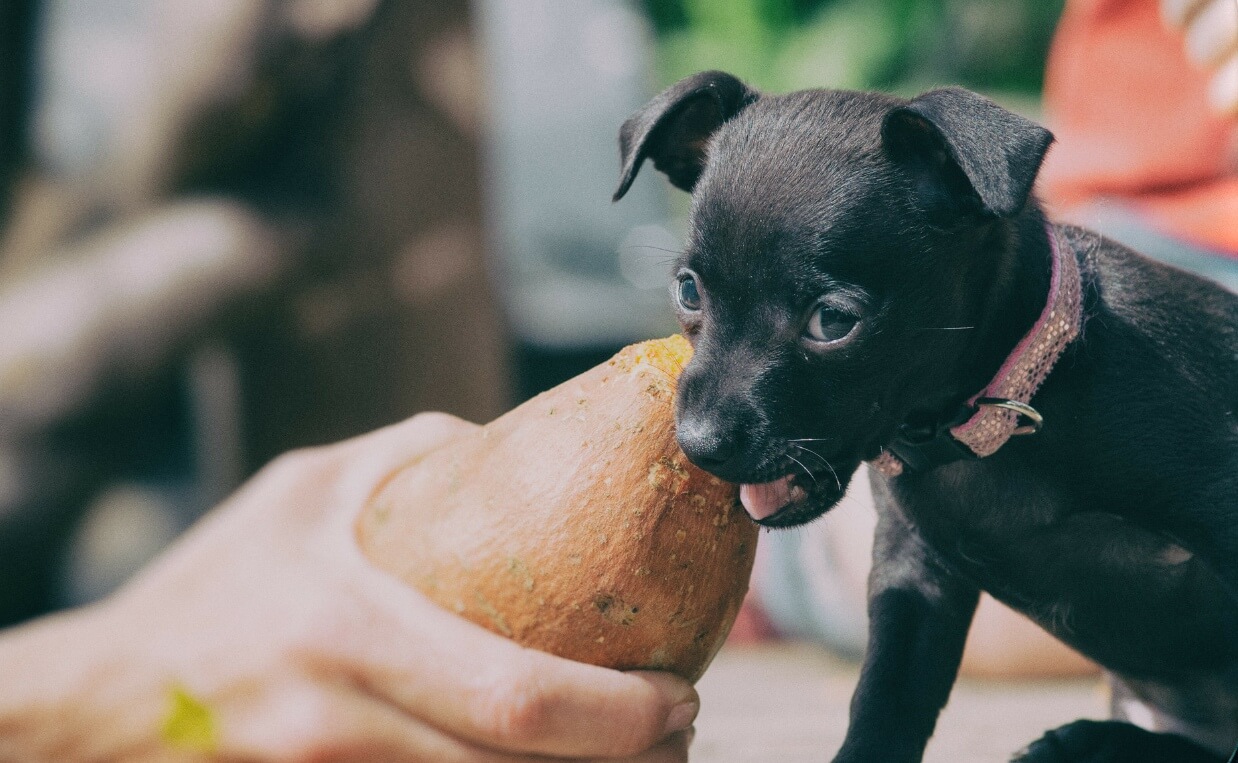
LEGUMES
Dogs can eat most cooked legumes in moderation, but some can be toxic.
Legumes Dogs CAN Eat
- Black beans
- Cannellini beans
- Lentils
- Lima beans
- Garbanzo beans
- Kidney beans (cooked, not raw)
- Pinto beans
- Soybeans
- Split peas
- White beans
Legumes Dogs CAN’T Eat
- Baked beans – high in sugar and may contain other foods toxic to dogs such as tomatoes, onions, garlic, etc.
- Chili beans – contains garlic, onion and spices
- Coffee beans – can cause neurological damage and even death
- Fava beans (or broad beans) – can cause vomiting, diarrhea and abdominal pain
- Refried beans – high in preservatives and seasonings not suitable for dogs
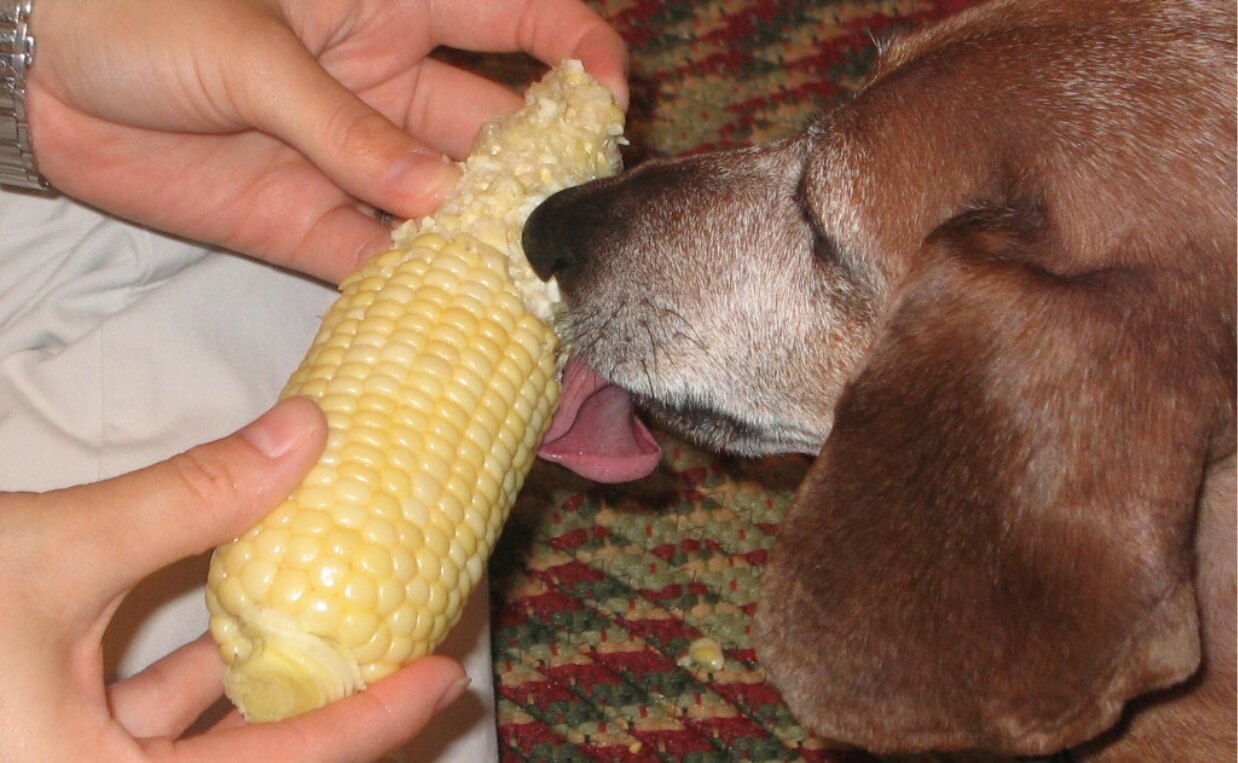
VEGETABLES
While dogs can eat most vegetables, be careful to give in moderation as many will cause indigestion due to the high fiber content.
Vegetables Dogs CAN Eat
- Artichoke hearts
- Bamboo shoots
- Beets
- Bell peppers
- Bok choy
- Broccoli
- Brussels sprouts
- Cauliflower
- Cabbage
- Carrots
- Celery
- Collard greens
- Corn
- Cucumbers
- Edamame (soybeans)
- Green beans
- Jicama
- Lettuce (includes iceberg, romaine, arugula, etc.)
- Mustard greens (not seeds)
- Parsnips
- Peas
- Potatoes (cooked, not raw)
- Pumpkin
- Radishes
- Rutabaga
- Spinach (in small amounts)
- Squash
- Sweet potatoes
- Turnips
- Yams
- Zucchini
Vegetables Dogs CAN’T Eat
- Asparagus – difficult for dogs to digest
- Garlic – garlic is in the onion family. It is a poison for dogs and can cause elevated heart rate, weakness and collapse.
- Kale – contains calcium oxalate which can cause kidney and bladder stones
- Mushrooms – some mushrooms are very toxic to dogs; it’s best to avoid mushrooms altogether
- Onions – dogs should NEVER eat onions, leeks, chives, garlic or any vegetable in the onion family.
- Raw potatoes – contain solanine which can be toxic
- Raw tomatoes – contain solanine which can be toxic
- Watercress – can cause kidney and thyroid problems
GRAINS
Unless your dog has a rare grain allergy, grains are not harmful to dogs. Whole grains are a source of nutrients and provide carbohydrates and antioxidants important for your dog’s health.
Grains Dogs CAN Eat
- Amaranth
- Barley
- Bulgur
- Corn – don’t feed them corn on the cob as it may cause an intestinal blockage
- Cornmeal
- Couscous
- Millet
- Oats
- Pasta
- Polenta
- Popcorn
- Quinoa
- Rice – white and brown rice are fine
- Spelt
- Wheat
Grains Dogs CAN’T Eat
Dogs should not eat grain-based processed foods due to high sodium and sugar additives, such as:
- Bread
- High-sugar cereals
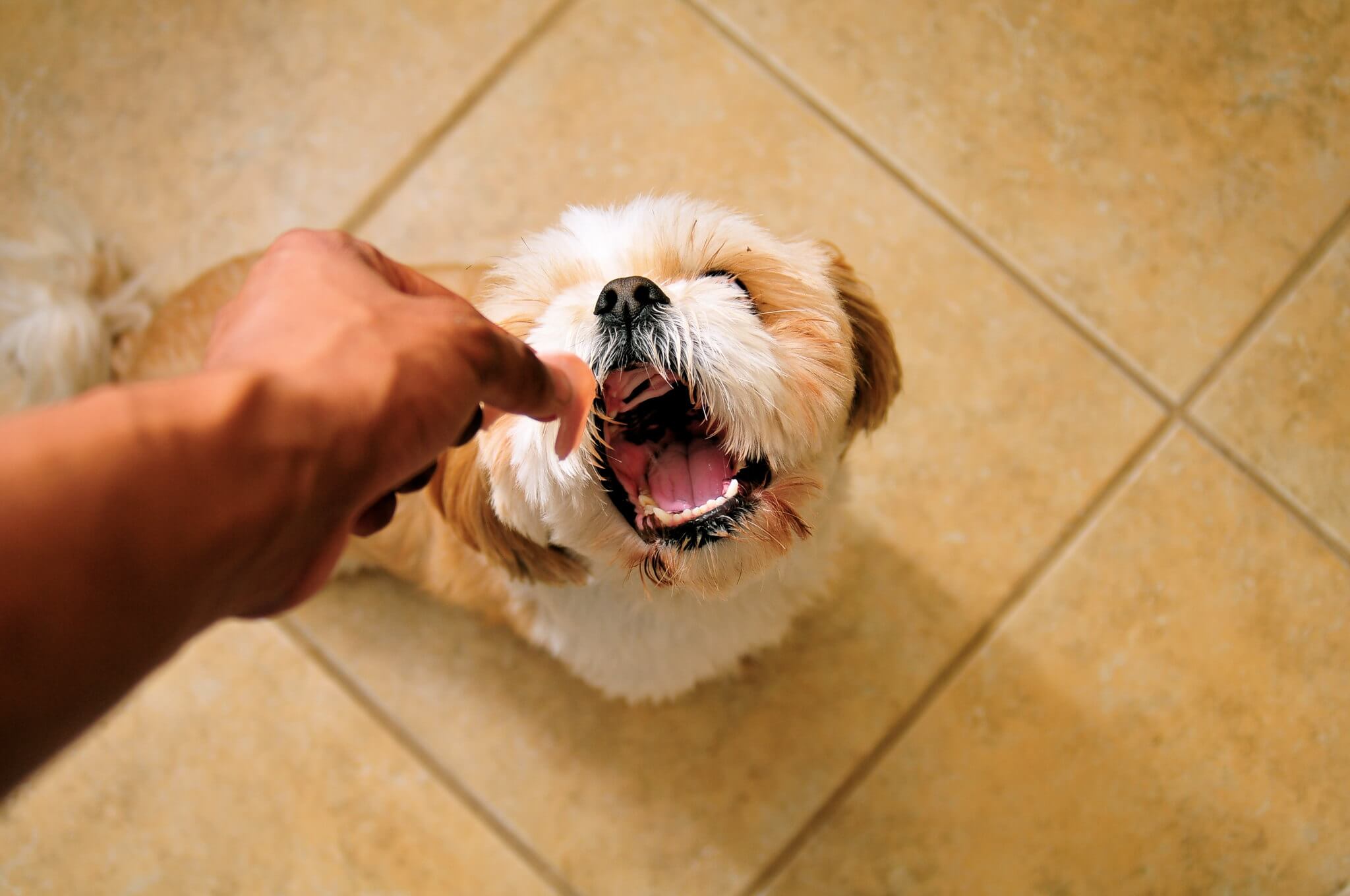
MEAT
Dogs can eat most meat.
Meat Dogs CAN Eat
- Beef
- Fish – remove bones before feeding and limit to no more than twice a week due to mercury and other chemical poisoning found in fish today
- Ham – limit due to high sodium and fat
- Pork
- Poultry
- Shellfish – cook fully
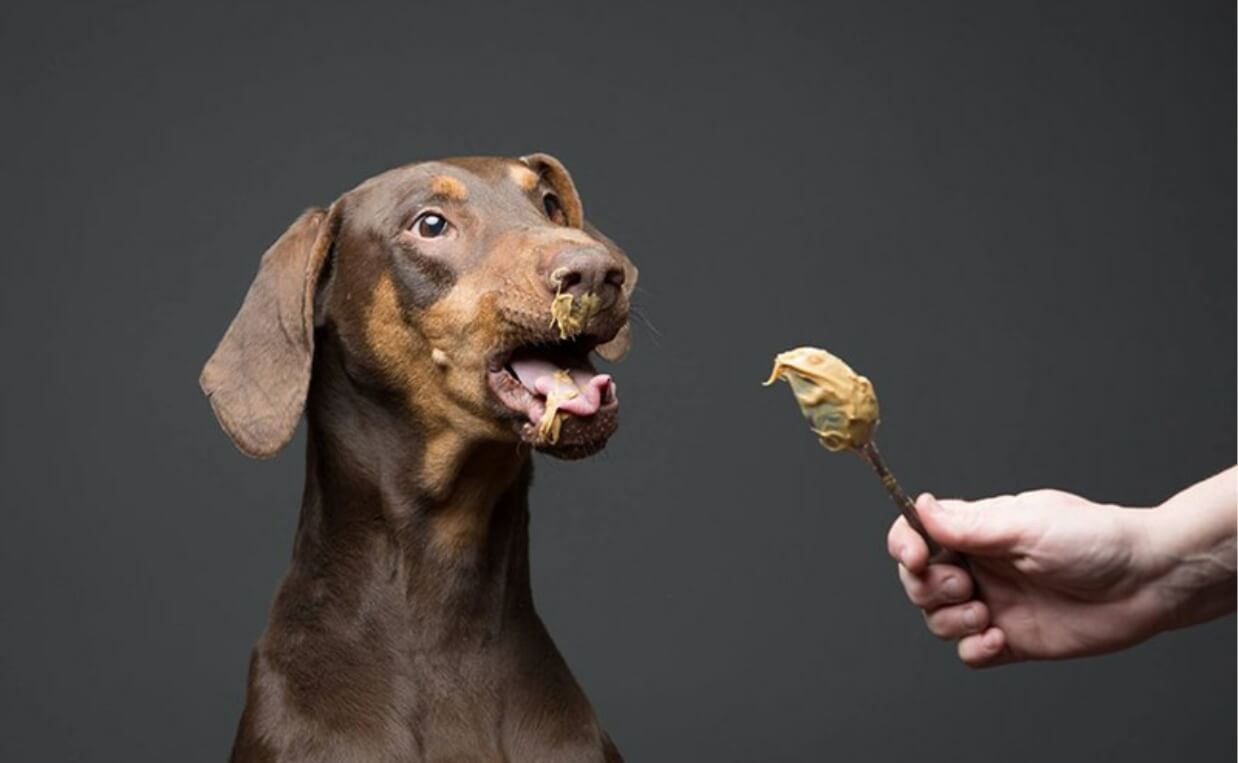
NUTS
While nuts have health benefits when included in a human diet, the long-term effects of eating nuts hasn’t been adequately studied to date. The prevailing theory is nuts are too fatty and calorie-dense to be a regular part of a canine diet.
However, most canine nutritionists agree an occasional indulgence of a few nuts on the “can eat” list won’t harm your dog.
Nuts Dogs CAN Eat
- Cashews
- Chestnuts
- Coconuts
- Hazelnuts and hazelnut butter
- Peanuts and peanut butter
Nuts Dogs CAN’T Eat
- Almonds – can block the esophagus or tear the windpipe
- Brazil nuts – long-term ingestion can cause pancreatitis
- Macadamia nuts – part of the Protaceae family, can cause vomiting, increased body temperature, inability to walk and lethargy.
- Pecans – contain aflatoxin which can cause liver damage
- Pistachios – contain aflatoxin which can cause liver damage
- Walnuts – cause vomiting, diarrhea and even seizure. There is a mold that grows on walnuts when they are laying on the ground that causes tremors and seizures.
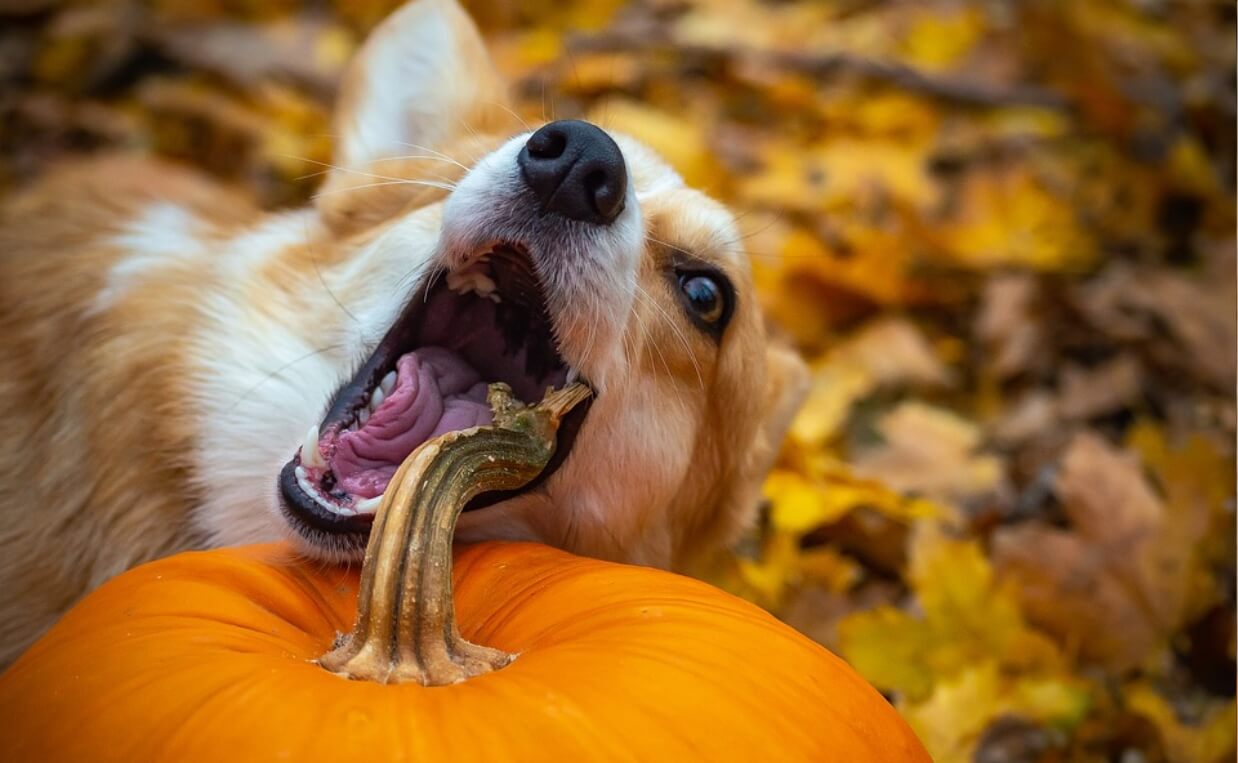
SEEDS
While dogs can eat most seeds, it’s best to soak them before feeding to your dog.
Seeds Dogs CAN Eat
- Chia seeds
- Flax seeds
- Hemp heart seeds
- Pumpkin seeds
- Sesame seeds
- Sunflower seeds
Seeds Dogs CAN’T Eat
- Mustard seeds
- Pine nuts – irritates stomach lining
- Pomegranate seeds – cause upset stomach
- Poppy seeds – contain an opioid which is highly toxic to dogs and can be lethal
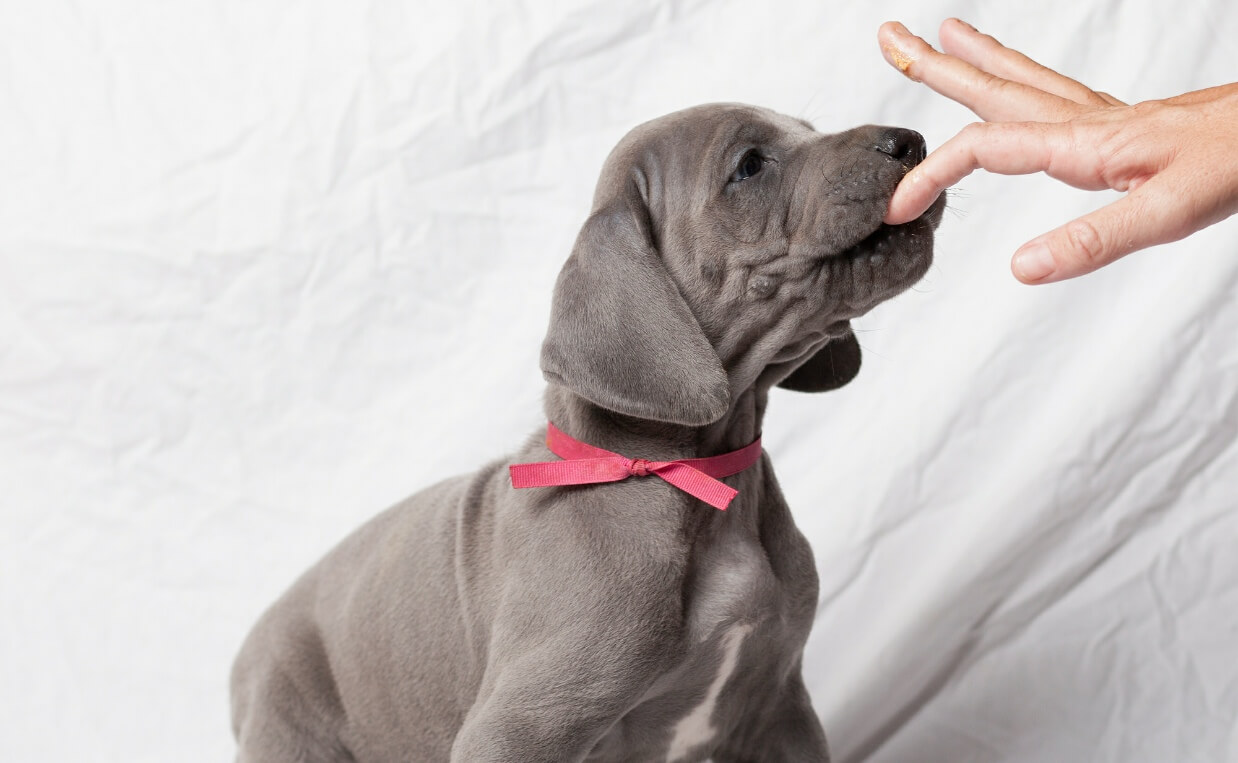
SPICES
Some, but not all, spices contain ingredients not safe for dogs to eat. If in doubt, don’t feed your dog foods containing spices.
Spices Dogs CAN Eat
- Black pepper (in small amounts – too much will irritate the stomach)
- Cardamom
- Cayenne
- Celery seeds
- Chili powder
- Coriander
- Cumin
- Fennel
- Fenugreek
- Ginger
- Honey
- Saffron
- Turmeric
Spices Dogs CAN’T Eat
- Allspice – contains eugenol which can cause liver toxicity
- Anise – can cause stomach upset
- Caraway seeds – in small amounts can cause stomach upset; in large amounts can cause liver and kidney damage
- Cloves – contains eugenol which can cause liver toxicity
- Cinnamon
- Garlic powder, minced garlic
- Onion powder, minced onions
- Leeks
- Nutmeg
- Salt – too much can cause sodium ion poisoning
- Vanilla extract and artificial vanilla – contain a high alcohol content

DESSERTS AND ALCOHOLIC BEVERAGES
Dogs CAN’T be fed any type of sugary confections due to their high fat and sugar content. Chocolate is especially dangerous for dogs. Like chocolate and onions, even small amounts of alcohol can have ingredients toxic to dogs, such as ethanol and hops.
The one exception to the “no sugar” rule is honey. Honey is packed with many nutrients and antioxidants helpful to dogs. Honey can also help dogs build immunities to local allergens.
Desserts and Alcoholic Beverages Dogs CAN’T EAT
- Beer
- Cake
- Candy
- Chocolate – contains theobromine, a caffeinelike molecule that increases blood flow to the brain
- Cookies
- Dessert sauces
- Doughnuts
- Ice creams
- Hard liquor
- Mixed drinks
- Pastries
- Pies
- Puddings
- Soft drinks
- Wine
- Wine coolers
The bottom line is some foods are safe and healthy for dogs, while others are harmful and could even be life-threatening.
Even if a food is on the “can eat” list, be careful to not overfeed your dog any particular food to prevent weight gain and other potential negative effects.
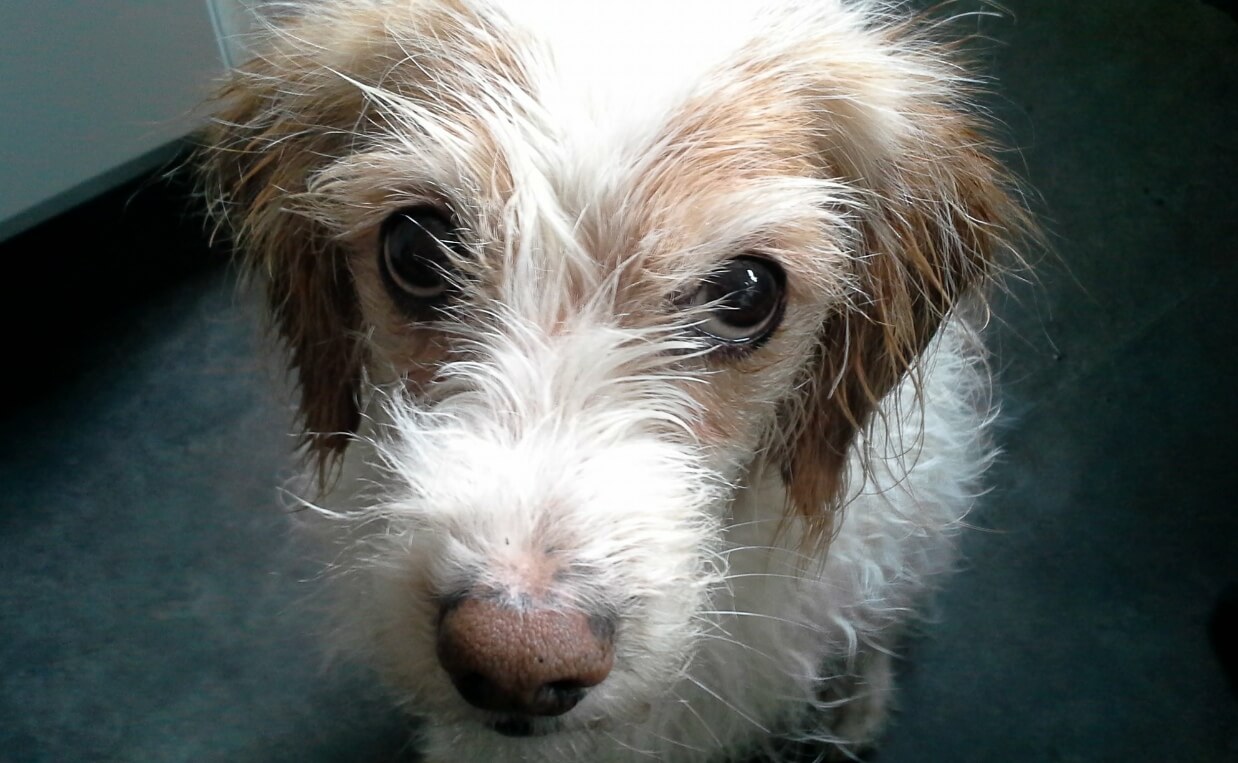
Keep in mind dogs are individuals. One dog may tolerate a food just fine, while another dog may experience an adverse reaction to the same food.
If you think your dog has eaten something he or she shouldn’t, call the Pet Poison Helpline for more information. They can be reached 7 days a week, 24 hours a day by calling 800-213-6680.
Are there any foods you think should be added to this list? Please comment below…

 8 Trustworthy Tips for Selecting the Right Dog Food
8 Trustworthy Tips for Selecting the Right Dog Food Does Acupuncture for Dogs Really Work?
Does Acupuncture for Dogs Really Work? 10 Foods to Feed Your Dog When Sick with an Upset Stomach
10 Foods to Feed Your Dog When Sick with an Upset Stomach Tick-Borne Diseases in Dogs – Symptoms and Treatment
Tick-Borne Diseases in Dogs – Symptoms and Treatment 5 Signs Your Dog Has Food Allergies
5 Signs Your Dog Has Food Allergies






It is an interesting and knowledgeable post. Although adding nuts to the human diet has health advantages, the long-term implications of consuming nuts have not been adequately investigated. According to popular belief, nuts, which are a common element of a dog’s diet, are thought to be heavy in fat and calories.
However, most canine nutritionists agree that a few nuts from the “can eat” list now and again will not hurt your dog.
Thank you for sharing your opinion, Mack. For anyone wanting additional clarification on this list, I suggest they ask their veterinarian, who is the authority when it comes to your dog’s health. Thanks for stopping by the Canine Campus blog!